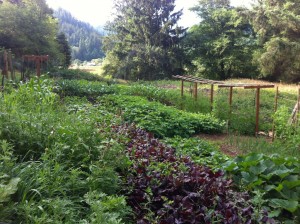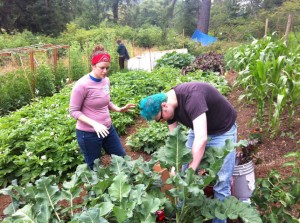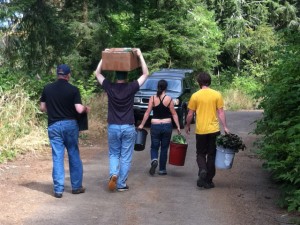 Wow, the last few weeks have been pretty hectic. I’d always heard that late summer was busy for farmers, and it seems to be true. Besides the obvious situation of all the plants going into overdrive all at once (including weeds!), our other jobs have suddenly started taking up a lot of time, as well as our participation in the boardrooms of seasonally-affected nonprofits like Food Roots and the Tillamook Farmers’ Market.
Wow, the last few weeks have been pretty hectic. I’d always heard that late summer was busy for farmers, and it seems to be true. Besides the obvious situation of all the plants going into overdrive all at once (including weeds!), our other jobs have suddenly started taking up a lot of time, as well as our participation in the boardrooms of seasonally-affected nonprofits like Food Roots and the Tillamook Farmers’ Market.
On top of that, we’ve had a lot of visitors. My parents came for a week, as did the Ellis/ Hoot Hoot clan. This has actually helped our time crunch as much as hindered it, since everyone involved wanted to help us with the farm. It’s really nice to know that people you love and respect see value in what you’re doing! My parents came out on several occasions to help weed, and Dad proclaimed the entire garden very impressive. The Ellis’ were equally enthusiastic and supportive, and when we mentioned our occasional disheartenment at all the work that remains, they were quick to point out that at this time a year ago, we had ABSOLUTELY NOTHING, not even an agreement to use the land. That really puts things in perspective.
Last Friday we harvested for the first time, and as luck would have it, the Ellis’ were excited to help. Emily and Christina both have experience with things agricultural, so they hopped around showing everyone what to do, what plants were ready, and what should stay for next time. After two hour of picking, we had tallied the following:
sweet peas- 6 pounds
Bake King white potatoes- 9 pounds
russet potatoes- 7 pounds
green beans- 4 pounds
“Bull’s Blood” beets- 8 pounds
broccoli- 13 pounds
That’s just the beginning; there is still a LOT of exciting produce one the way. We washed, sorted, bundled, weighed, and tagged everything with prices that were in line with those at Emily’s other farm job. Pretty tired, we were in bed by about 11pm.
The next morning, Emily and I got up at about 6am to go to the farmers’ market in Tillamook to see what we could sell. Food Roots operates a community table at the market where home gardeners and startup businesses can sell their produce without having to go to the trouble and expense of having their own stall. Since Emily would be working the table that day, we were granted relief from the consignment fee. As part of the Market board, I have to man the market office a few Saturdays every summer, so I kept busy with that.
A bit before noon, we moved over to cover a booth for our friends Lance and Tammy, who had to leave the market early for a wedding. This gave us our first chance to talk all day.
“Did you see the price on potatoes?” Emily asked, frowning. I had noticed them earlier, and was dismayed… one vendor was selling them for $1.00 a pound, the other for $.80. We were asking $4.00, the standard rate at the other market we attend in Manzanita. “I saw a guy actually pick up ours, say ‘I don’t need potatoes that bad,’ and walk away.”
Ouch. How can we compete with vendors who sell for a quarter of the “right” price? People that can charge those prices usually get them that low by using illegal labor, chemicals, mechanization, long-haul transportation, or all of the above. In contrast, we steward the land so it will produce forever and build fertility naturally, we don’t use chemicals (which, by the way, usually come from the petroleum based products shipped from the middle east), use a minimal amount of diesel fuel, we grow everything within 20 miles of the market… and we deserve to earn a living wage.
So, why does this matter? Sustainability. There will come a day when there is no more cheap oil to make the pesticides and chemical fertilizers, or to run the tractors. One day, the land will stop producing healthy food if we strip it of its nutrients without returning them. Maybe some day a natural disaster will cut our community off, so the semi trailers from Portland can’t get to Safeway for a few weeks, leaving the shelves bare after just two days (like happened during the big storm of ’96)- forcing people to survive on what comes from the local fields.
Of course, the fellow who didn’t buy our potatoes, like most consumers, doesn’t see this complicated interaction of market forces that puts him at risk- he just sees price tags. But if we as a community allow our local, hard-working farmers to be driven out of business by these hidden costcutting measures, then basically our whole society becomes a fragile house of cards, balancing on the edge of starvation at the whim of natural disaster.
I guess this is our greatest challenge, our dragon to slay, the thing that keeps us getting up in the morning when we feel tired and beat down and demoralized. Farming as we do is nothing less than a fight to keep our friends and families safe.
We talked about this on our drive home, and realized that our first inclination to give up on the Tillamook market would be turning away from a great and noble challenge, our real calling. We could easily fill our week with other markets where we CAN get $4/pound for organic potatoes, but we’d be abandoning a community that we’ve decided to become a part of. So, we think it’s pretty likely that next year we WILL have a market stall at Tillamook in addition to the markets that we know will work, like Manzanita. And we WILL keep our prices high- we have too much self respect to sell ourselves as slaves. But our real goal in Tillamook will be as educators, teaching the public what sustainable food is about. And if we manage to sell some produce in Tillamook at the same time, that would be a pleasant side effect.



